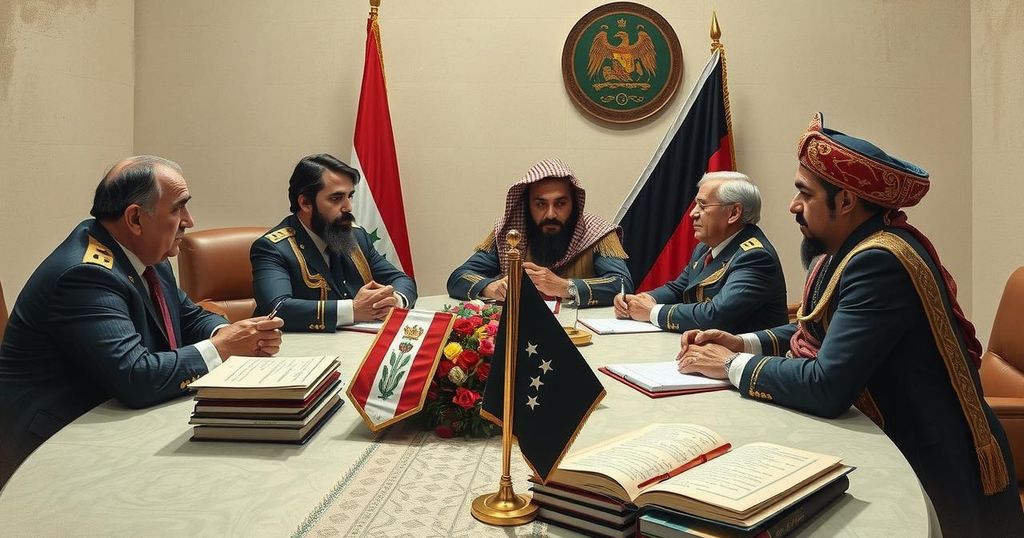International Diplomacy Intensifies with Syria’s New Interim Leadership
Nations are increasingly engaging with Syria’s new interim rulers after the ousting of Bashar al-Assad by Islamist rebels. UN envoy Geir Pedersen emphasizes the need for a just and inclusive administration, while diplomatic efforts from Qatar and Turkey signal a shift in foreign relations. The aftermath reveals a humanitarian crisis, with urgent calls for aid amid recovery efforts and ongoing military concerns.
Governments around the world are intensifying diplomatic efforts to engage with Syria’s interim authorities following the recent ousting of President Bashar al-Assad by Islamist-led rebels. This rapid takeover has resulted in widespread celebrations throughout Syria, marking the end of Assad’s longstanding oppressive regime. Notably, students in Damascus express a newfound sense of optimism and liberation after years of fear and repression. However, the international community is now faced with the complex task of formulating a coherent approach towards the new leadership, particularly in light of the involvement of Hayat Tahrir Al Sham (HTS), an organization designated as a terrorist entity by several Western nations.
UN envoy Geir Pedersen has been actively advocating for the establishment of an inclusive administration that prioritizes national reconciliation and justice. His discussions with HTS leadership focus on ensuring accountability for past crimes and avoiding acts of vengeance. Meanwhile, a delegation from Qatar has arrived in Syria with a commitment to support the Syrian populace, while Turkey has reopened its embassy, illustrating the shifting dynamics in diplomatic relations. Despite reservations regarding HTS, both the United Kingdom and the United States have confirmed their engagement with the organization in a diplomatic context.
The civil war, which has claimed over 500,000 lives and displaced millions, began with President Assad’s violent crackdown on protests in 2011. Following the recent change in leadership, many former detainees have recounted their traumatic experiences of torture under the Assad regime. As some degree of calm returns, educators report that children are returning to school, signifying a recovery of normalcy.
Despite the prospects for rebuilding, significant challenges loom due to the widespread devastation of infrastructure and societal structures in Syria. Calls for immediate humanitarian aid are urgent, with several nations, including Ukraine, coordinating assistance of essential supplies such as wheat and oil. The new transitional government has pledged to protect the rights of all Syrians, assuring religious and ethnic minorities of their safety.
The geopolitical landscape remains tenuous, particularly with Israel’s ongoing military activities in Syria, which have escalated following Assad’s decline. As the international community navigates this transformative phase in Syria’s history, a careful balance must be struck to effectively support the nation while addressing the complexities introduced by HTS and their role in the new government.
The political landscape in Syria has drastically shifted following the removal of President Bashar al-Assad after a violent civil war that began in 2011. This conflict has caused immense humanitarian suffering, resulting in substantial loss of life and widespread displacement. The emergence of Islamist-led groups such as Hayat Tahrir Al Sham raises complicated questions for foreign governments aiming to establish relationships with Syria’s new interim authorities, given HTS’s ties to Al-Qaeda and its terrorist designation. The international response has included diplomatic overtures by numerous countries, eager to engage in the nation-building process following decades of brutal rule under Assad.
The recent developments in Syria signal a significant shift in its governance, marking the end of a prolonged authoritarian rule. As global powers scramble to adapt their foreign policies in response to this new reality, the imperative remains to foster an inclusive and just government that meets the needs of all Syrians. However, the complexities surrounding the entities in power pose ongoing challenges for international diplomacy and humanitarian efforts. Ensuring stability while addressing the needs of diverse communities within Syria will be crucial in the coming months and years.
Original Source: jordantimes.com




Post Comment